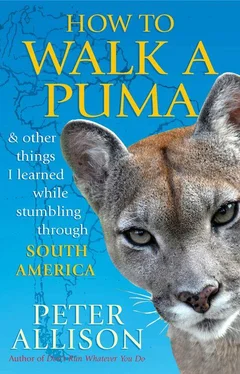Hearing the screams, my first thought was that surely we were under attack, and in my fevered state my only defence would be to appear so weak I might be spared. The wailing though was short lived, not cut off, and faded to the muttering of someone in a dream state. It had been a nightmare, no more, and while the screamer mumbled themselves back to sleep I lay awake, adrenalin coursing for some time, wondering how close the nearest Tagaeri or Taromenane might be.
Normally I would be excited by the level of mystery surrounding these peoples, but in the pitch black of a jungle night it was just intimidating and I was glad to have the many spears of my new Huaorani friends close by.
•
As a rule I don’t believe that any race has more smart or dumb people than any other, or good or bad, and it irritates me when people say things like, ‘Oh, you must just love the people in Africa!’ as I think it is a sign of covert racism. But among the Huaorani I met more extraordinary people than in any other small group I had ever encountered.
Otobo was a natural host and guide. He effortlessly switched between the demands of the elderly English bird watchers and the more culturally interested Americans, reading their needs as neatly as if he had been to the finest tourism management school. His father was a god in the forest, a hunter of note, capable of turning invisible when he wanted to. Omagewe might also be the most dangerous man I have ever met, with a significant body count of petroleros and illegal loggers to his name, yet his good humour and constant laughter made it almost impossible for me to imagine him as a spear-wielding killer.
Then there was Penti, who I met in Bameno. Unlike most Huaorani, who are a stocky people, Penti was slender, and sported a natty Clark Gable moustache. But it was what he said that made him stand out. For more than twenty years he had fought to protect his home from oil companies, and he was articulate and knowledgeable about the challenges the Huaorani face from those who would take their land. Recently, illegal oil exploration had taken place; Penti told me that if he couldn’t stop this through legal means it would be solved the Huaorani way, with a spear. He explained that twice before oil companies had been allowed to extract oil from within the national park, and both times it was disastrous. Texaco spilled more oil in the Ecuadorian Amazon than the Exxon Valdez did in Alaska in 1989, and the roads that were built through the forest to facilitate the extraction are like leukaemia, spreading the poison of illegal logging and poaching, along with the colonists who move illegally in from outside areas and whom the government has no will to move. These invaders continue to make their way deeper into the park, sullying once pristine blocks of wilderness and encroaching ever more into Huaorani territory.
Many of the Huaorani came to visit our campsite, downstream from Bameno, in canoes, and we travelled back to visit them in Bameno, a torturous journey for me as my fever returned with a vengeance. The sunlight off the water was like spears in my eyes, the roar of the motor deafening. When we arrived in Bameno, Tom, Mariela, Allan and Fernando would fly out, and with some trepidation, but mainly enthusiasm for adventures ahead, I would be left alone with the Huaorani for two weeks.
‘Did I scream out last night?’ Fernando asked on the canoe. ‘I think I was having a nightmare.’
That explained the scream that had woken me the night before. I wasn’t surprised Fernando had experienced a nightmare: the very air in this place felt hallucinogenic, or maybe it was just my fever. As soon as we made it to Bameno I curled up to rest in a hammock in Otobo’s Bameno home. The house was made of palm poles and thatched with leaves, which offered some respite from the blinding heat outside.
I was woken some time later by a squawking macaw that wandered in, screeched at me several times, then ambled back out. Through gaps in the rough walls I could see village life as it puttered all around, some people cooking, some snoozing, and a desultory soccer game being played so lazily I almost felt well enough to join in. People in various states of undress walked in and out, some shaking me awake to ask questions like: ‘In the United States how many wives do you have?’ (It didn’t matter how many times I said I was Australian, all foreign cowodes are from America.)
‘I have only one,’ I said (they also make no distinction between a wife and girlfriend), ‘but she is in England.’
‘Huh,’ they scoffed, ‘you should get more,’ then they walked away, chasing out the chickens that came and went as freely as the people.
Otobo told me he needed more than just his current sole wife, but was too busy with his ecotourism business at the moment. The two travelling bands of the last week were the first foreigners many of the Huaorani had seen in more than a year. ‘Yes, but I am the busiest tourism operator here!’ Otobo said proudly. ‘I have many more tourists than anyone else!’
•
As I sat down to write in my diary on the second-last day of 2010, I realised that and I had no idea what day of the week it was, nor any interest in finding out. Dates were becoming as irrelevant to me as they are to the Huaorani. Huao numbers only go as high as twenty; after that they simply use the words for ‘a lot’ ( nange ) and ‘many’ ( baco ). Even the numbers they do have are complicated to say—their count goes ‘one’, ‘two’, ‘two and one’, ‘two and two’, ‘five’, ‘five and one’, and so on. Technically you could go higher than twenty, so for example to give my age—thirty-six—I would say: ‘ Bototepenpoga go tepenpoga go tepenpoga go emempoke go arokai .’ Or I could simply say ‘ Baco .’
This complexity is probably why most Huaorani will tell you some patently absurd figure when you ask how old they are. When I asked Quempere’s age I was told, variously, ‘More than one hundred’, ‘Somewhere near sixty’, and one youngster gravely told me that he was ‘probably more than twenty’, clearly impressed at such longevity. (‘He’s probably in his eighties,’ Tom had said, ‘just based on the age of his children and their children.’)
The tribespeople jabbed at my notebook now as I wrote; only the youngest among them and the educated Penti were able to read (and even then they learnt Spanish, not English), but they were all fascinated by the marks I made on the page. It would have felt like a breach of privacy anywhere else, but here it was not at all unpleasant or invasive.
As I wrote that morning the same macaw had walked into Otobo’s house again, spoken a few words, laughed, and walked out.
‘Great,’ I thought, ‘even a bloody parrot speaks more Huao than me.’
One of the few terms I had become proficient with was ‘ waponi ’, a versatile word that means ‘hello’, ‘thanks’ and ‘good’; when said with a smile it covered much of what needed to be said.
Earlier that morning I’d been woken up by the sound of voices. Looking out of my hammock I could see a gap in the wall; peering through this, straight at me, was the jaguar shaman.
‘ Waponi , Quempere,’ I said, then added, ‘ Ibanoimi? ’ which means ‘How are you?’ In reply he laughed, walked in and sat beside me, his wife following. With clawed hands he picked up and studied my hair, teeth and palms, before clapping my hands together, laughing heartily once more.
As he chatted to me in soft tones, his wife (a sprightly sixty or so to Quempere’s estimated eighty) laughed at everything he said. The only person I’d felt sorry for in my time there was the aggressive man who on my very first night had spoken at us about his life, including his time with the missionaries, and all he had learnt from them. Throughout his diatribe he’d had his hands clasped in supplication, with the lightless eyes and forced grin of someone who has been told to be happy. Maybe it wasn’t the fault of the missionaries, but something was lost in him; he seemed to lack a brightness, a beauty, that the other Huaorani carried so casually.
Читать дальше












